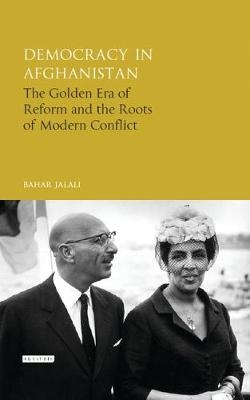
Democracy in Afghanistan
The Golden Era of Reform and the Roots of Modern Conflict
Seiten
2024
I.B. Tauris (Verlag)
978-1-78453-828-6 (ISBN)
I.B. Tauris (Verlag)
978-1-78453-828-6 (ISBN)
- Noch nicht erschienen
- Versandkostenfrei
- Auch auf Rechnung
- Artikel merken
The first English account to draw a line of continuity between Afghanistan's 'decade and democracy' and the last three decades of conflict, with consideration of the implications on Afghanistan today.
The decade of democratic reforms in Afghanistan, 1963-1973, is often viewed as a 'golden era' of stability and progress. Bahar Jalali demonstrates, however, that the roots of Afghanistan's turbulent recent history can be traced back to precisely this period. It was at this time that the swift implementation - and ultimately failure - of progressive reforms gave rise to extremist ideologies that would go on to become politically dominant over the next three decades. The initial promise of liberalisation and modernisation in 1963 quickly unravelled in the face of inter-elite competition, factions within the royal family, practical paradoxes in the constitution and the growth of oppositional movements (namely communists and Islamists) out of sync with the state's rhetoric. By tracking this period in detail for the first time, Jalali establishes exactly why the last three decades of conflict in Afghanistan can be said to have their roots in this formative period, and demonstrates the importance of recognising this today.
In work based on primary sources, interviews with key figures (including the royal family and the former king), and work in contemporary Afghanistan, Jalali raises timely questions regarding the politics and impact of Western-authored democratic reforms and addresses various historiographical and contemporary misconceptions. Democracy in Afghanistan is essential reading for all scholars interested in the political, diplomatic and internal struggles of an embattled Afghanistan, and its future.
The decade of democratic reforms in Afghanistan, 1963-1973, is often viewed as a 'golden era' of stability and progress. Bahar Jalali demonstrates, however, that the roots of Afghanistan's turbulent recent history can be traced back to precisely this period. It was at this time that the swift implementation - and ultimately failure - of progressive reforms gave rise to extremist ideologies that would go on to become politically dominant over the next three decades. The initial promise of liberalisation and modernisation in 1963 quickly unravelled in the face of inter-elite competition, factions within the royal family, practical paradoxes in the constitution and the growth of oppositional movements (namely communists and Islamists) out of sync with the state's rhetoric. By tracking this period in detail for the first time, Jalali establishes exactly why the last three decades of conflict in Afghanistan can be said to have their roots in this formative period, and demonstrates the importance of recognising this today.
In work based on primary sources, interviews with key figures (including the royal family and the former king), and work in contemporary Afghanistan, Jalali raises timely questions regarding the politics and impact of Western-authored democratic reforms and addresses various historiographical and contemporary misconceptions. Democracy in Afghanistan is essential reading for all scholars interested in the political, diplomatic and internal struggles of an embattled Afghanistan, and its future.
Bahar Jalali is senior education advisor at the University of Arkansas and associate professor at the American University of Afghanistan, where she founded Afghanistan's first department of gender studies. She received her PhD from Berkeley and has published in peer-reviewed journals.She also serves as a consultant for various international organisations and comments regularly on current events and developments in Afghanistan.
Chapter 1—Reform Periods Prior to 1963
Chapter 2—Decade of Daud: 1953–1963
Chapter 3—Interim Government: March 1963–October 1965
Chapter 4—The Royal Family
Chapter 5—Governments of the Decade of Democracy
Chapter 6—Parliament
Chapter 7—Communist and Islamist Movements
| Erscheint lt. Verlag | 14.1.2024 |
|---|---|
| Sprache | englisch |
| Maße | 138 x 216 mm |
| Themenwelt | Geschichte ► Allgemeine Geschichte ► Zeitgeschichte |
| Geisteswissenschaften ► Geschichte ► Regional- / Ländergeschichte | |
| Sozialwissenschaften ► Politik / Verwaltung | |
| ISBN-10 | 1-78453-828-0 / 1784538280 |
| ISBN-13 | 978-1-78453-828-6 / 9781784538286 |
| Zustand | Neuware |
| Haben Sie eine Frage zum Produkt? |
Mehr entdecken
aus dem Bereich
aus dem Bereich
Gewalt, Umwelt, Identität, Methode
Buch | Softcover (2024)
Spector Books OHG (Verlag)
CHF 49,95
wie Freud im Kollektiv verschwand
Buch | Hardcover (2024)
Klett-Cotta (Verlag)
CHF 34,95


